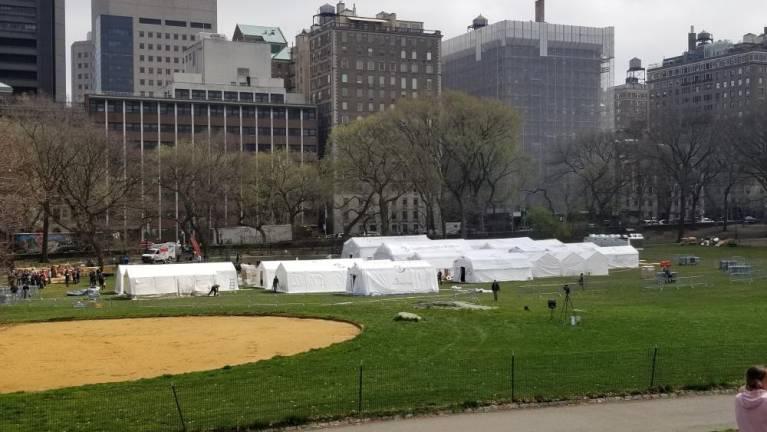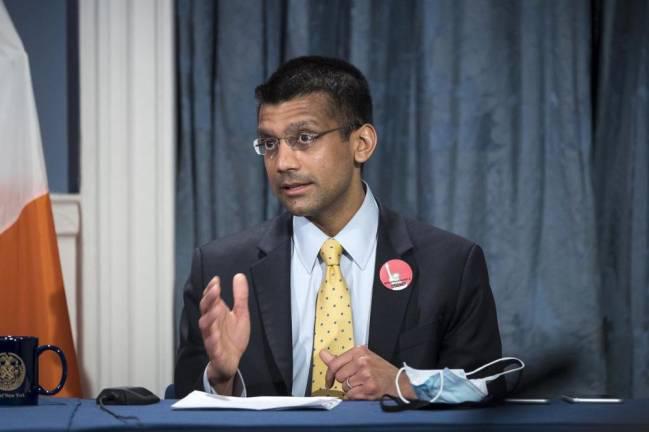An Unhappy Anniversary for COVID-19
Three years after the first known cases, health experts fear we have not improved pandemic preparedness or investment in research


The anniversary of an event that has killed some 15 million people around the world, so far, would seem to cry out for a remembrance. But first we would have to recognize that this third anniversary of COVID-19 is, indeed, upon us.
By the estimate of one researcher, that anniversary is this Thursday, November 17. The researcher, David L. Roberts at the University of Kent, projected back from the first known cases, in Wuhan, in mid-December to the day he estimates to be most likely for the SarS-CoV-2 virus to have first produced symptoms in a human being.
So, maybe, Thursday is the right day for our global moment of silence. Or we could pick another moment. But at this moment we seem singularly unfocused on either what we’ve been through or what we are continuing to experience as the virus ripples round the world.
“We continue to feel the aftershocks,” said Dr. Dave Chokshi, who served as New York City health commissioner in the midst of the pandemic. “Except as I stumble through the rubble and the wreckage, I get the disconcerting feeling that other survivors seem to think it is just fine to carry on with their lives as before these giant shocks, or not to think about how to build structures that are less fragile when the ground shakes.”
I write this on Veteran’s day, about a public health fight that has taken more American lives than all the nation’s wars combined. Yet the message from Chokshi and other public health experts is there is much now at stake here beyond honoring those who died.
“My argument to you,” Chokshi told a gathering of the United Hospital Fund earlier this year, “is that we cannot accept this. We will dishonor the memory of all those we have lost if we simply snap back— or ignore the impetus for change.”
Chokshi is far from alone in the public health world in arguing that inadequacies and inequities in the health care system helped cause the horrifying death toll, both here in New York and around the world.
“We have not invested in or improved pandemic preparedness at the federal, state and local levels, which was already woefully under-resourced,” said Professor Denis Nash of the CUNY School of Public Health. This showed in the response to COVID and continued to show in Monkeypox, he said.
Top Lessons
Nash runs a consulting business that advises companies and institutions on how to prepare for public health challenges. Pandemic preparedness was just the first of five points he offered when asked what he felt were the top lessons we still needed to learn on this third anniversary (whatever day you chose to mark it). The others were:
* “Political leaders followed their own lead and disempowered subject matter experts (everyone loses scenario).”
* “Messaging has been and continues to be completely off, with no politicians able to figure out how to move forward and reduce the impact of the pandemic.”
* Misinformation/disinformation can be as big of a threat as the pathogen in pandemics, and we have no coherent strategy to combat it.”
* “Research and evidence generation has been subpar. Many of the answers we need could have been achieved rapidly with more investment in research studies by CDC and HHS, and more research capacity in state/city health departments. The U.K. led the world here.”
You can see, the to-do list to prepare for the next pandemic is long.
Improving Our Air
Other researchers point out that society seems to be slow in adapting the crucial lesson that an airborne virus can and should be suppressed by improving our air, particularly indoor air, through better ventilation, filters and the wider use of Far UV Light, which kills viruses (Including cold and flu virus) but doesn’t harm people.
The question of when the virus started and how many have died also remain topics we need to understand better to prevent future calamities, the experts said.
Chokshi cites the 15 million death toll even though the World Health Organization’s website lists only 6.5 million confirmed deaths from COVID-19. The higher number represents fatalities during the pandemic in excess of what would have been expected based on death rates before the pandemic.
This, Choksi said, is “more accurate when looked at globally and almost certainly still an undercount.”
The question of when the pandemic started is also crucial to curtailing the next one.
“From an early detection stand point, it is always a worthwhile endeavor to understand how long spread had been happening before it was recognized as a threat,” said Nash of CUNY. “This helps you understand what things may have been missed so that you can trouble shoot and improve chances of early detection in the future.”
“Fixing the Problems COVID-19 Has Exposed”
In other words, it is important to know if November 17, 2019, really is the day this started, not just to honor the fallen, but because it was nearly two months before China acknowledged how much trouble it was in.
“With new pathogens the best advantage we have is early detection and the extra time that it buys us to understand and respond to limit the threat to public health,” Nash said.
“The focus now should be on fixing the problems COVID-19 has exposed,” wrote Professor Michael Worobey of the University of Arizona.
In a study of the early days of the COVID-19 spread in China, Worobey noted that China actually had, on paper, a powerful screening system for spotting mysterious cases of Pneumonia of Unknown Etiology (PUE), established after SARS.
But what looked good on paper didn’t work in practice because doctors at local hospitals failed to report early cases. He proposed “blanketing the globe with a highly function PUE early warning system.”
Chokshi warns against repeating what happened after the Great Influenza of 1918, which came to be known as the “Forgotten Pandemic,” as the world moved on to rebuild after the war.
“I know I will not forget this pandemic, and I suspect you won’t either,” he told the United Hospital group. “Whether the broader society does, however, is up to us. It starts with sharing our stories, honoring the valor and excellence of our health care and public health heroes, and joining together to write the next chapters — as is our duty, as survivors.”
Dr. Dave Chokshi warns against repeating what happened after the Great Influenza of 1918, which came to be known as the “Forgotten Pandemic.”